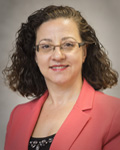Geriatric Psychiatry Can Help Adults Navigate All The Transitions That Come With Aging.
 "Improving with Age” is the title of a presentation that Lina Shihabuddin, MD, Chief Medical Officer, Behavioral Health Network at RWJBarnabas Health (RWJBH), likes to give.
"Improving with Age” is the title of a presentation that Lina Shihabuddin, MD, Chief Medical Officer, Behavioral Health Network at RWJBarnabas Health (RWJBH), likes to give.
“A lot of things do get better with age,” says Dr. Shihabuddin, who is board-certified in adult and geriatric psychiatry as well as hospice and palliative medicine. “Growing older should not be thought of as a bad thing, but as a transition to a different phase of life.”
That’s a call not just to think positive, but also to think about aging and health in a new way. It’s the approach health care practitioners like those in the RWJBH Behavioral Health Network are taking when they proactively screen for depression and anxiety in primary care settings.
“It’s no longer ‘I have a disease, so I need to see a doctor,’” Dr. Shihabuddin explains. “It’s ‘I need to be well.’ Screening and early intervention helps patients of every age stay ahead of the game.”
Issues Of Aging
Geriatric psychiatry, also known as geropsychiatry, refers to mental health care of a person 65 years or older. “People seek out geriatric psychiatry for two reasons,”
Dr. Shihabuddin says. “One, they may be dealing with very normal life adjustments that come with aging, which may include retirement, loss of a partner or distance from family.
“A second level of the issue is the start of memory problems, erratic behavior, possibly unsafe driving,” Dr. Shihabuddin says. “Is this the beginning of dementia, or a reversible medical problem? That’s where the intersection of primary care, neurology and geriatric psychiatry really comes into play.” Anxiety, depression and other issues can be triggered by a wide range of conditions, such as thyroid dysfunction, vascular problems, obesity or untreated diabetes.
Once the problem is diagnosed, health care providers can come up with a treatment plan, which may include anything from treating a disease, to creating a safer environment at home, to finding ways to be sure the patient has activity during the day, to teaching family members how to minimize conflict.
“The last resort, for us, is to offer medications,” such as antidepressants or sleep aids, Dr. Shihabuddin says.
“Medications have more side effects for geriatric patients, and take longer to get out of the system. In treating geriatric patients, you have to start at very low dosages and slowly increase the dose if needed.”
Taking The First Step
Dr. Shihabuddin urges older adults (or their loved ones) to speak with their primary care provider as soon as signs of depression or anxiety appear. “The earlier you detect and treat a disorder, the better off you are,” she says.
Getting older gets a bad rap, Dr. Shihabuddin believes. “Yes, as the body ages, the neurons in the brain cells get less flexible, so it may be harder to learn new things,” she says. “On the other hand, the mind is more mature, giving older people the ability to look more analytically at situations and take them in stride. That’s what we call wisdom.
“People think about aging and they tend to think about things falling apart, ” Dr. Shihabuddin says. “If we do enough early detection and prevention, it does not have to be like that.”
To learn more about geriatric psychiatry services in the RWJBarnabas Health system, visit www.rwjbh.org/geriatricpsych.